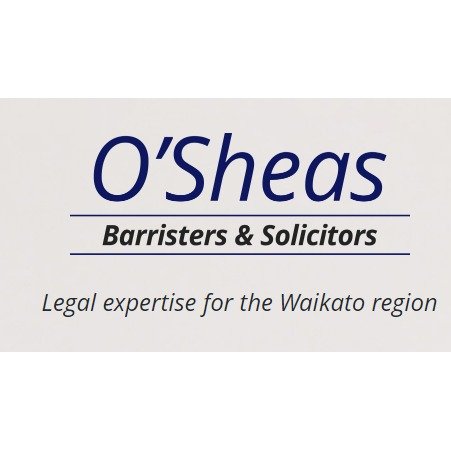Best Renewable & Alternative Energy Lawyers in Hamilton
Share your needs with us, get contacted by law firms.
Free. Takes 2 min.
List of the best lawyers in Hamilton, New Zealand
About Renewable & Alternative Energy Law in Hamilton, New Zealand
Renewable and alternative energy law in Hamilton is focused on the policies, regulations, and legal frameworks that govern the development, installation, and operation of sustainable energy sources. These sources typically include solar, wind, hydro, geothermal, and bioenergy. The city of Hamilton, located in the Waikato region, plays an important role in New Zealand’s transition toward cleaner, more sustainable energy solutions. The legal environment encompasses both national legislation and local rules that support innovation while ensuring the community and environment are protected.
Why You May Need a Lawyer
Individuals and businesses in Hamilton may require legal assistance in the renewable and alternative energy sector for a variety of reasons. Common situations include negotiating energy supply contracts, navigating consent processes for new projects, interpreting property rights related to energy infrastructure, and resolving disputes with local authorities or neighbors. Other situations may involve compliance with environmental regulations, understanding government incentive schemes, or dealing with land use and zoning issues. A lawyer with experience in renewable and alternative energy law can provide crucial guidance and help you achieve your goals efficiently while avoiding legal pitfalls.
Local Laws Overview
Hamilton’s renewable and alternative energy sector is influenced mainly by the Resource Management Act 1991 (RMA), which governs resource use and environmental protection in New Zealand. Under the RMA, activities such as installing wind turbines, solar panels, or hydro installations may require resource consent from the Waikato Regional Council or Hamilton City Council. Local district plans further outline where energy projects can be developed and stipulate design, noise, and visual impact requirements. The Electricity Act 1992 and associated regulations set standards for safety and supply. New Zealand’s Emissions Trading Scheme and government policies, such as the commitment to carbon neutrality, also shape the local legal landscape, promoting increased use of renewable energy while imposing certain obligations on businesses and developers.
Frequently Asked Questions
What types of renewable energy are most common in Hamilton?
Solar, wind, and small-scale hydro power are the most commonly utilized renewable energy sources in and around Hamilton.
Do I need consent to install solar panels on my home or business?
In most cases, residential solar panel installations are considered permitted activities and do not require resource consent. However, larger commercial installations or certain areas may require approval from the council.
Can I sell electricity generated on my property back to the grid?
Yes, you can export surplus electricity generated from renewable sources to the national grid, subject to terms set by your electricity retailer and compliance with safety and metering regulations.
Are there incentives or subsidies available for renewable energy projects?
Government grants and incentives are available from time to time, especially for research or community-scale projects. It’s important to check the latest information from agencies like the Energy Efficiency and Conservation Authority.
What environmental assessments are required for a new renewable energy project?
Most projects will require an environmental impact assessment as part of the resource consent process, focusing on effects such as noise, landscape, and ecosystems.
Who do I contact for approval to develop a renewable energy project?
Small projects often involve the Hamilton City Council, while larger or regionally significant developments may require permission from the Waikato Regional Council.
What are the main risks in renewable energy contracts?
Risks may include unclear terms around financing, access to property, delivery schedules, liability for delays, and compliance with local laws. A lawyer can help identify and mitigate these risks.
Do I need to consult with neighbors about renewable energy installations?
Depending on the project size and location, consultation with neighbors may be required during the consent process, particularly if there are potential adverse effects on adjoining properties.
Are there specific building codes for renewable energy installations?
Yes, installations must meet relevant building codes and standards for safety, electrical connections, and structural integrity. Council approval may be needed before starting work.
What happens if my project infringes on protected land or habitats?
Activities affecting protected areas, heritage sites, or sensitive ecosystems may be strictly controlled, and unauthorized development can result in enforcement action or fines. Early legal advice is crucial in such cases.
Additional Resources
If you are seeking more information or support regarding renewable and alternative energy in Hamilton, consider reaching out to these organizations and agencies:
- Hamilton City Council - For local planning and resource consent advice
- Waikato Regional Council - For regional environmental compliance and policy guidance
- Energy Efficiency and Conservation Authority (EECA) - Provides information on grants and best practices
- Ministry of Business, Innovation and Employment (MBIE) - For national regulations and policies relating to energy
- Sustainable Energy Association New Zealand (SEANZ) - Industry advice and advocacy for renewable energy users and providers
Next Steps
If you are considering a renewable or alternative energy project, or facing a legal issue in this sector, it’s important to act carefully and seek professional advice early. Begin by outlining your goals and gathering relevant documents, such as property details and plans. Contact a lawyer experienced in renewable and alternative energy law in Hamilton to discuss your specific situation. They can advise you on compliance, consents, contracts, and dispute resolution, helping you navigate regulatory processes smoothly. Remember, every project and issue is unique - professional legal assistance is the best way to protect your interests and ensure long term success in the renewable energy sector.
Lawzana helps you find the best lawyers and law firms in Hamilton through a curated and pre-screened list of qualified legal professionals. Our platform offers rankings and detailed profiles of attorneys and law firms, allowing you to compare based on practice areas, including Renewable & Alternative Energy, experience, and client feedback.
Each profile includes a description of the firm's areas of practice, client reviews, team members and partners, year of establishment, spoken languages, office locations, contact information, social media presence, and any published articles or resources. Most firms on our platform speak English and are experienced in both local and international legal matters.
Get a quote from top-rated law firms in Hamilton, New Zealand — quickly, securely, and without unnecessary hassle.
Disclaimer:
The information provided on this page is for general informational purposes only and does not constitute legal advice. While we strive to ensure the accuracy and relevance of the content, legal information may change over time, and interpretations of the law can vary. You should always consult with a qualified legal professional for advice specific to your situation.
We disclaim all liability for actions taken or not taken based on the content of this page. If you believe any information is incorrect or outdated, please contact us, and we will review and update it where appropriate.

















